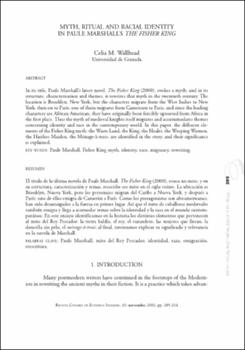Myth, Ritual and Racial Identity in Paule Marshall's The Fisher King
Author
Wallhead, Celia M.Date
2002Abstract
El título de la última novela de Paule Marshall, The Fisher King (2000), evoca un mito, y en
su estructura, caracterización y temas, reescribe ese mito en el siglo veinte. La ubicación es
Brooklyn, Nueva York, pero los personajes migran del Caribe a Nueva York, y después a
París; uno de ellos emigra de Camerún a París. Como los protagonistas son afroamericanos,
han sido desarraigados a la fuerza en primer lugar. Así que el mito de caballeros medievales
también emigra y llega a acomodar temas sobre la identidad y la raza en el mundo contemporáneo.
En este ensayo identificamos en la historia los distintos elementos que pertenecen
al mito del Rey Pescador: la tierra baldía, el rey, el curandero, las mujeres que lloran, la
doncella sin pelo, el ménage-à-trois; al final, intentamos explicar su significado y relevancia
en la novela de Marshall. In its title, Paule Marshall’s latest novel, The Fisher King (2000), evokes a myth; and in its
structure, characterisation and themes, it rewrites that myth in the twentieth century. The
location is Brooklyn, New York, but the characters migrate from the West Indies to New
York, then on to Paris; one of them migrates from Cameroon to Paris, and since the leading
characters are African American, they have originally been forcibly uprooted from Africa in
the first place. Thus the myth of medieval knights itself migrates and accommodates themes
concerning identity and race in the contemporary world. In this paper, the different elements
of the Fisher King myth: the Waste Land, the King, the Healer, the Weeping Women,
the Hairless Maiden, the Ménage-à-trois, are identified in the story, and their significance
is explained.





